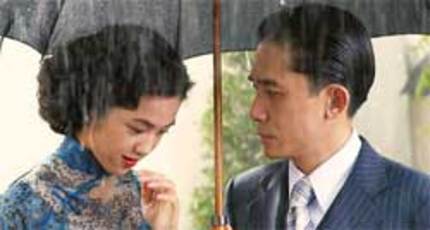TIFF Report: LUST, CAUTION Review

At one point, just over the halfway mark of Ang Lee's new film, Tony Leung and fresh young face Tang Wei are a chaotic ball of merged flesh, with arms, legs and such sticking outward in all directions. This is sort of what Lust, Caution’s structure feels like, lots of tangents and exposition going nowhere and what is up on the screen is beautiful but obviously just two people fucking. Lust, Caution is the first Ang Lee film in memory that feels straightforward, even inevitable. At 157 minutes it is more than a bit of a slog.
The story follows Wong Chia Chi, a plain peasant girl who ends up in school in Hong Kong. Through a friend, she joins a group of patriotic, if naïve, drama students who put on propaganda laced plays to show the spirit of the Chinese in the face of the Japanese Occupation. The thrill of the performance and the passion of their leader (who was unable to join the Chinese Army, despite a willingness to do so) binds the group close together, shown in a post-show celebration and a wistful late night ride around Hong Kong. Eventually (and this is a good 35 minutes in at this point) the group take their drama and patriotism to the next level by plotting the political assassination of a minister of the collaborating Chinese government. The plan is for each of the students to assume a role to allow Wong Chia Chi to get close enough or lure the minister away from his compound so they can kill him. Tony Leung hovers in the background as more or less a ghost for the first half of the film, the quiet mannered and serious target of the theatre group assassination plot. Eventually, Wong falls in love, well lust, with the man, complications of loyalty ensue. Leung comes into the forefront at this point and the film becomes highly sexualized. It also introduces some genre-style elements of the assassins (now mentored by a more trained Chinese resistance movement), but quickly abandons them, as this is as more a character study than a spy melodrama.
There in lies the chief problem. “If you pay attention, nothing is trivial” a line of dialogue which could not be a more false description of Lust, Caution. The story is simultaneously simple and sprawling, the characters are one note and rather flat. The story (outside of the historical elements of Shanghai and Hong Kong) is underwritten to the point of folding in on itself. The second film in a row for Lee expanding a short story into a more sprawling film. Larry McMurtry and Diana Ossana did a much better job with Annie Proulx's Brokeback Mountain than James Schamus and Wang Hui Ling do with Eileen Chang's material. And any dramatic and thriller elements are diffused by having scenes near the end of the film act as a prologue, and the sexual scenes, while revealing to the point of showing genitalia, add little to the characters.
Perhaps Lee is saying that war makes prostitutes of us all. Several of male students have a go at Wong Chia Chi in a botched attempt of sexual education before she enters the minister’s live as a mistress. The rich wives club (constantly playing Mahjong), Wong’s gateway into Mr Yee’s home-life, seem primarily concerned with the carat size of their diamonds over any feelings for their husbands, and the interior ministry is certainly not above suspecting and using its own against their will. In many ways everyone is using everyone and Wong Chia Chi the chief victim in which the all characters orbit. Is the audience/filmmaker/studio relationship so different? Lust, Caution's execution does not make the subject compelling enough to warrant these types of considerations though.
Actress Tang Wei goes from earthy and proletariat looking as a student to porcelain doll in society and from an awkward and innocent asexual girl to gymnast-minx in bed, but doesn’t seem to have much else going on get a reaction. She’s believable in the part, no doubt, but the character is empty on screen. Tony Leung can play this type of character in his sleep (and for the first half of the film, aims to demonstrate that very fact). Mr. Yee, who graduates from bureaucrat to head of the secret police over the timeline of the film and ghost to slow-burn angry spirit, serves only to remind viewers how much better (soulful) he did this type of character: the former in Wong Kar Wai’s In the Mood for Love, the latter in 2046.
Handsome production design and pretty faces (even after being ‘broken’ by the secret police, some of the drama students remain fresh-faced with a tiny bloody streak and a grimace) are the chief assets here, this is pageantry of the Hollywood kind if you go for that sort of thing. Tone is favoured over the genre elements, and a rather dry history lesson favoured overall. It’s clear that Love, Caution was never a working title as there is nothing of that emotion on display anywhere in the film. Given the glossiness of the production, it seems strange. In the art-house world, this is Ang Lee’s Pearl Harbour, with the audience draw (and NC-17 marketing hook) not being a point-of-view bomb-cam as it crashes into naval hardware, as displayed in Michael Bay’s misfired epic, but rather in gorgeously lit, yet bombastic sexual gymnastics. Certainly this is the largest disappointment of the festival so far.







